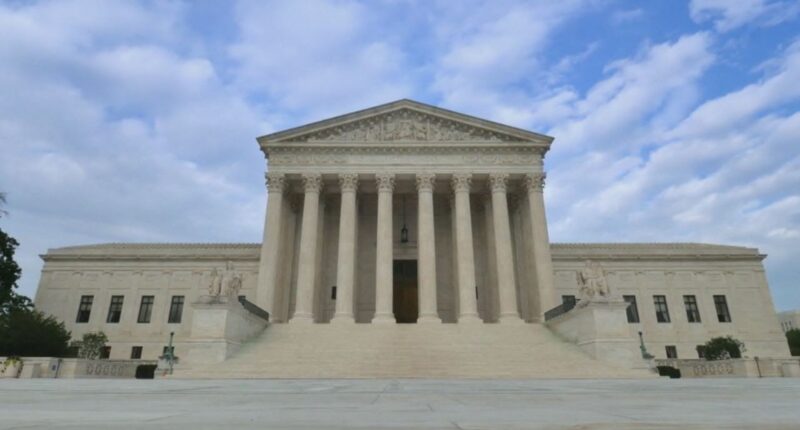Medical treatment for transgender children, endorsed by major American medical associations and safely used for decades, was the focus at the U.S. Supreme Court on Wednesday as the Biden administration and three families with transgender teenagers asked the justices to strike down a state law banning some gender-affirming care for minors.
The landmark case — U.S. v. Skrmetti — comes from Tennessee, which is among 26 states that have moved to prohibit administration of puberty-blocking medication and hormone therapy to minors who seek to identify with, or live as, a gender identity inconsistent with his or her sex at birth.
Oral arguments, which began just after 10 a.m., marked the first time the nation’s highest court has openly considered a state law targeting transgender people. It is also the first time an openly transgender litigator, ACLU attorney Chase Strangio, argued a case in the Supreme Court chamber.
The historic hearing thrusts the justices to the forefront of a cultural debate that has sharply divided the country and tested the limits of science and parental rights.
MORE | What medical care for transgender minors is at stake in Supreme Court case?
The outcome of the case could determine access to health care for hundreds of thousands of trans teens and more broadly influence how communities treat transgender people in hospitals, schools and on sports fields.
The government argues that Tennessee’s SB1, which was enacted in March 2023, violates the Constitution’s equal protection clause because it discriminates on the basis of sex to decide who can receive otherwise legal medical treatments available to youth.
“Put simply, an adolescent assigned female at birth cannot receive puberty blockers or testosterone to live as a male, but an adolescent assigned male at birth can,” the administration wrote in its brief to the court.
Solicitor General Elizabeth Prelogar, kicking off the arguments, called it “facial sex classification” as she argued the high court should remand the case so the Tennessee law can be reconsidered under a higher standard of scrutiny that requires it serve an important government objective and be substantially related to achieving that objective.
“If you change the individual sex, it changes the result,” Prelogar said. “That’s a facial sex classification, full stop. And a law like that can’t stand on their rationality.”
The Tennessee law expressly allows minors who are not transgender to receive gender-affirming treatments to address a “congenital defect, precocious puberty, disease, or physical injury.”
Denying discrimination, the state argues its law is a reasonable regulation of medical treatment based on its purpose, meant to protect children from potential long-term health risks and possible irreversible changes to the body.
“It’s application on medical purpose, not on a patient’s sex,” Texas Solicitor General Matthew Rice said in defense of the law before the court.
Rice contended the Constitution’s equal protection clause “does not require the states to blind themselves to medical reality or to treat unlike things the same, and it does not constitutionalize one side’s view of a disputed medical question.”
The law’s Republican sponsors claim that contradictory scientific evidence and documented regret among some young people who have transitioned both warrant caution in developing standards of care.
The law also cites a “compelling interest in encouraging minors to appreciate their sex, particularly as they undergo puberty” and preventing them from becoming “disdainful of their sex.” The government says the text proves an intent to enforce gender conformity.
Chief Justice John Roberts questioned on Wednesday whether the Supreme Court was “best situated” to address evolving medical issues, or if they should “leave those determinations to the legislative bodies.”
Justice Sonia Sotomayor contended that any medical treatment carries risk.
“So the question in my mind is not, do policymakers decide whether one person’s life is more valuable than the millions of others who get relief from this treatment? The question is, can you stop one sex from another sex from receiving that benefit?” Sotomayor said.
Hundreds of Tennessee transgender children were receiving treatments before SB1 was enacted, legislators concluded. It is not known how many suffered alleged harm.
The plaintiffs in the case include 16-year-old LW and her parents Brian and Samantha Williams of Nashville. After several years of successful hormone therapy, LW now has to travel out of state to continue treatments she says have dramatically improved her quality of life.
“I feel normal now,” LW said in an exclusive interview with ABC News last month.
“Our state legislature had made such a big deal out of parents rights during COVID, about masks and vaccines — that that’s for parents to decide these medical decisions for their children,” noted Samantha Williams. “And then, they made this medical decision for our child.”
Nationwide, an estimated 300,000 Americans ages 13 to 17 identify as transgender, according to the Williams Institute at UCLA School of Law. Of those, nearly 100,000 live in states that have banned access to gender-affirming medical treatments for minors.
“It’s a case of enormous significance that presents fundamental questions about the scope of state power to regulate medical care for minors, of the rights of parents to make medical decisions for their children… and the level of scrutiny that courts should apply to laws that discriminate against transgender people in general,” said Deepak Gutpa, a veteran Supreme Court litigator. “This is a major, major constitutional civil rights issue.”
More than 60% of Americans say they oppose law banning certain types of gender-affirming medical treatment for minors, according to Gallup.
Major American medical associations have endorsed the treatments for more than a decade as part of “individually tailored interventions” to support trans kids and affirm their sense of self. Not all transgender children seek medical care to facilitate transition to another sex.
“It needs to be part of a very deliberate process that involves medical specialists, who are expert at doing this, and, again, are following the science,” said Dr. Ben Hoffman, a pediatrician and president of the American Academy of Pediatrics. “It all begins and ends with science. This is not about any sort of agenda.”
Clinical practice guidelines from the American Endocrine Society, based on more than 260 research studies, recommend the use of puberty-delaying medications and waiting until a child reaches adulthood to consider gender-affirming surgery.
The American Academy of Pediatrics says the effects of puberty blockers are not permanent if treatment is discontinued. Many effects of hormone therapy can also be reversed. Long-term risks may include fertility challenges and possible harm to bone density, but the group says those risks require further study.
In contrast to the U.S. medical establishment, several European countries, including the United Kingdom, have reversed course on the use of gender-affirming treatments as a standard-of-care for transgender children, citing insufficient scientific evidence of long-term benefits.
“When you look at the totality of the medical research, to me there is more than enough uncertainty and evidence of bad outcomes for kids who’ve gone through these treatments when they reach the later stages in life,” said Tennessee Senate GOP Leader Jack Johnson.
A federal district court sided with the plaintiffs, temporarily halting enforcement of SB1, but the Sixth Circuit U.S. Court of Appeals reversed. The panel of judges concluded Tennessee had a rational basis for enacting the law.
“Kind of the whole ballgame in the case is the debate about whether there actually is discrimination on the basis of sex,” said Erin Murphy, a Supreme Court litigator and former clerk to Chief Justice John Roberts.
“It’s really not,” Murphy argued. “To say providing testosterone to a biological boy and biological girl is the same thing because testosterone is involved — it’s a different treatment that has different risks.”
David Cole, former legal director of the American Civil Liberties Union, which is representing the Williams family, says the court’s conservative majority will have to confront the legacy of its decision.
“I think there’s no question in 25 years that the court will have recognized that treating people differently because their gender identity is sex discrimination,” Cole said.
“The question is whether the court wants to write a decision will be overturned, you know, in the course of the next 10 years or 15 years,” he said, “or whether it wants to recognize what is going on, which is sex discrimination.”
A decision in the case is expected by the end of June 2025.
The Supreme Court is hearing arguments Wednesday in just its second major transgender rights case, which is a challenge to a Tennessee law that bans gender-affirming care for minors.
The justices’ decision, not expected for several months, could affect similar laws enacted by another 25 states and a range of other efforts to regulate the lives of transgender people, including which sports competitions they can join and which bathrooms they can use.
The case is coming before a conservative-dominated court after a presidential election in which Donald Trump and his allies promised to roll back protections for transgender people.
Four years ago, the court ruled in favor of Aimee Stephens, who was fired by a Michigan funeral home after she informed its owner that she was a transgender woman. The court held that transgender people, as well as gay and lesbian people, are protected by a landmark federal civil rights law that prohibits sex discrimination in the workplace.
The Biden administration and the families and health care providers who challenged the Tennessee law are urging the justices to apply the same sort of analysis that the majority, made up of liberal and conservative justices, embraced in the case four years ago when it found that “sex plays an unmistakable role” in employers’ decisions to punish transgender people for traits and behavior they otherwise tolerate.
The issue in the Tennessee case is whether the law violates the equal protection clause of the 14th Amendment, which requires the government to treat similarly situated people the same.
Tennessee’s law bans puberty blockers and hormone treatments for transgender minors, but not “across the board,” lawyers for the families wrote in their Supreme Court brief. The lead lawyer, Chase Strangio of the American Civil Liberties Union, is the first openly transgender person to argue in front of the justices.
The administration argues there is no way to determine whether “treatments must be withheld from any particular minor” without considering the minor’s sex.
“That is sex discrimination,” Solicitor General Elizabeth Prelogar wrote in her main court filing.
The state acknowledges that the same treatments that are banned for transgender minors can be prescribed for other reasons. But it rejects the claim that it is discriminating on the basis of sex. Instead, it says lawmakers acted to protect minors from the risks of “life-altering gender-transition procedures.”
The law “draws a line between minors seeking drugs for gender transition and minors seeking drugs for other medical purposes. And boys and girls fall on both sides of that line,” Tennessee Attorney General Jonathan Skrmetti wrote in the state’s Supreme Court brief.
While the challengers invoke the 2020 ruling in Bostock v. Clayton County for support, Tennessee relies on the court’s precedent-shattering Dobbs decision in 2022 that ended nationwide protections for abortion and returned the issue to the states.
The two sides battled in their legal filings over the appropriate level of scrutiny the court should apply. It’s more than an academic exercise.
The lowest level is known as rational basis review and almost every law looked at that way is ultimately upheld. Indeed, the federal appeals court in Cincinnati that allowed the law to be enforced held that lawmakers acted rationally to regulate medical procedures, well within their authority.
The appeals court reversed a trial court that employed a higher level of review, heightened scrutiny, that applies in cases of sex discrimination. Under this more searching examination, the state must identify an important objective and show that the law helps accomplish it.
If the justices opt for heightened scrutiny, they could return the case to the appeals court to apply it.
Gender-affirming care for youth is supported by every major medical organization, including the American Medical Association, the American Academy of Pediatrics and the American Psychiatric Association.
But Tennessee is pointing to health authorities in Sweden, Finland, Norway and the United Kingdom that found that the medical treatments “pose significant risks with unproven benefits.”
None of those countries has adopted a ban similar to the one in Tennessee and individuals can still obtain treatment, Prelogar wrote in response.
The Williams family of Nashville, Tennessee are among those challenging the state law. Brian Williams said that as a result of puberty blockers and hormone treatments, his transgender daughter, L.W., is a “16-year-old planning for her future, making her own music and looking at colleges.”
But because of Tennessee’s ban, she has to travel to another state to receive the health care that “we and her doctors know is right for her.”
Copyright © 2024 ABC News Internet Ventures.
















